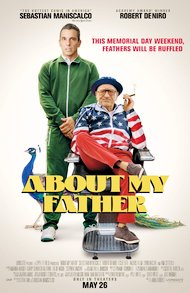About My Father
 for suggestive material, language and partial nudity.
for suggestive material, language and partial nudity.
Reviewed by: Jim O'Neill
CONTRIBUTOR
| Moral Rating: | Very Offensive |
| Moviemaking Quality: |
|
| Primary Audience: | Adults |
| Genre: | Comedy |
| Length: | 1 hr. 29 min. |
| Year of Release: | 2023 |
| USA Release: |
May 26, 2023 (wide release) DVD: August 1, 2023 |





Poor man, rich woman culture clash
Frequent anxiety attacks
Anxiety and Worry—What does the Bible say? Answer
Life and issues of immigrant families in America
Italian culture




| Featuring |
|---|
|
Robert De Niro … Salvo Sebastian Maniscalco … Sebastian Leslie Bibb … Ellie Kim Cattrall … Tigger David Rasche … Bill Anders Holm … Lucky Brett Dier … Doug Jonathan Van Ness … Jonathan Van Ness See all » |
| Director |
|
Laura Terruso |
| Producer |
|
Depth of Field Lionsgate See all » |
| Distributor |

Stand-up comedy has been in a state of decline for some time. Sebastian Maniscalco’s comic routines buck that trend because he shuns the elite condescension that drips from the tongues of most of today’s comics. Refreshingly, he focuses on the every-day, especially the Italian every-day, punctuating its precarious balance of chaos and benevolence.
I have never seen Maniscalco live, but I have watched his act on television. He is an undeniable talent. He works the camera as well as he does the theatre. He is always in motion, circling the bare stage in Chaplinesque style, but there is also something in the way he uses his eyes that can really grab a screen viewer. I haven’t seen that kind of eyeball darting and popping since Zero Mostel put it to use, or over-use, in his 1960s screen comedies.
Maniscalco has done film acting before. He pulled off a successful cameo as Crazy Joe Gallo in Martin Scorcese’s “The Irishman” (2019). As the unstable Gallo, Maniscalco delivered his lines in rat-a-tat machine gun style that brought a few minutes of energy to an over-long movie whose battery was on low from the moment the story opened.
Unfortunately, Maniscalco’s starring vehicle, “About My Father” is a re-tread of the now familiar, and overdone, poor boy-rich bride culture clash genre. From “Auntie Mame” to “Crazy Rich Asians” to the “Meet the Parents” abominations, the premise is a tired one, and Maniscalco’s efforts bring few surprises and no insights.
Maniscalco plays a middle class Chicago hotel manager, an odd career choice for someone who suffers anxiety attacks whenever confronted with a dilemma, be it colossal or minute. To relieve stress Sebastian breathes into a paper bag, sucks on a lemon, walks like a duck, or just yells. He’s not the kind of concierge you would want to call with a room service complaint.
Sebastian’s father, Salvo, played by Robert De Niro has a close but frayed relationship with his son. Salvo, a Sicilian immigrant, is a Chicago hairdresser, who is attached to his modest life, his Chicago neighborhood, and his Italian heritage. He misses his recently deceased wife and Sebastian’s mother, someone Sebastian, himself, never mentions.
Sebastian has hopes of elevating his own working man status. He dreams of class, wealth and respectability all epitomized by his bubbly but not unspoiled girlfriend, Ellie (Leslie Bibb), a Chicago artist and the daughter of a wealthy hotel chain owner. Ellie’s family, whose descendants arrived in America on the Mayflower, live on a sprawling Virginia estate with antique furniture, helicopters, yachts, and pet peacocks. Ellie’s father’s name is William Collins XII; her brother, William Collins XIII.
The entitled, privileged, rich-guy jokes roll out endlessly but never land. The Virginia scions are reworkings of Thurston Howell III and his wife, Lovey, from the 1960s sit-com, “Gilligan’s Island” but this update lacks the blue-blood nonchalance that invites a kind of respectful mockery. Here, derision is on full display while deference is cast aside. As Salvo points out to his son about rich people he has known: “the fancier they are, the dirtier they are.”
Despite so many grandiose but chintzy displays of consumption, Sebastian is enthralled with Ellie’s “style and positivity”—an odd assessment considering she is a non-self-aware, two-dimensional artist and someone whom Salvo warns his son “puts her feet up on the coffee table.” Something feels missing in this romance, perhaps because no real sparks fly, and especially because there is no glimpse of the divine in Sebastian’s longing for his beloved. His is a far cry from Dante’s ideal love for Beatrice, “a god stronger than I who comes to rule over me.”
Ellie’s family invites Sebastian and Salvo to their Virginia home for a Fourth of July celebration during which Sebastian plans to propose to Ellie. Sebastian is sure his father will reject the invitation, but when asked, Salvo agrees to go. While Sebastian is determined to fit in with the Collins clan and meet with their approval, Salvo wants to go so he can give his own thumbs up or thumbs down. Together they journey from the Chicago city streets to the idylls of the Virginia countryside.
Mayhem, of course, ensues, but the panoply of high jinks and culture clashes are all ones which you have seen before. I have only seen one other movie by director Laura Terruso, 2019’s “Good Girls Get High” a “girls-night-out” copy of the Harold and Kumar films. Each frame of that read like a Xerox of something I saw before. Terruso may have a future in remakes and sequels, but nothing so far that I’ve seen would mark her as an original. Her direction, along with the embarrassing script by Maniscalco and Austin Earl, reject calm and understatement while they allow ribald humor, crude visual gags, and ultimately mawkish sentiment to rule the day. Maniscalco’s embarrassing nude scene, one in which his Versace swim trunks fall down while he is sky surfing, is not only ridiculous but as long in the tooth as his script and his performance. As a successful stand-up he should know that if a joke goes kaput, don’t linger on it. Save face and move onto a new one.
For a movie about family, especially one with an Italian sensibility, there is little warmth, none of poignant moments of “Moonstruck” or “Big Night” or even “Saturday Night Fever.” It lacks the touching sensitivity of scenes in Fellini’s “Nights of Cabiria,” Visconti’s “Rocco and His Brothers” or Benigni’s “Life is Beautiful” where tragedy and comedy sit side by side, elucidating and rounding out the human condition. Perhaps Italian culture has been irreparably marred by what we have seen on the the big and little screens from “The Godfather” to “The Sopranos” and even to “Jersey Shore.” I never took to “The Godfather” the way my fellow film-lovers have. I do not like the way its story of family life descends into darkness letting whatever warmth it began with ultimately die. Even in the womb. Despite all its bloodletting, to me it is a bloodless ghost.
“About My Father” never comes alive enough to even pass on to becoming a ghost. The romance at the heart of the story never catches fire. It is ironic that Sebastian and Ellie are not young suitors. Both actors who portray them are nearly fifty years old. There is no sense of love in bloom that you might expect or hope for in such a story. And there is no talk of children, so it feels even more sterile. It lacks tenderness, something essential to a love story, the kind written about in the Book of Tobit that Tobias shows toward Sara as well as to her parents and to his own mother and father. In that love, there is no self-gain or intrigue. Is the object of Sebastian’s affection the woman he loves or is it the worldly realm of which she is a part that moves him to court her? It’s hard to say.
The film has a particularly weak grasp of the immigrant experience and its profound effect on the person starting a new life in a new land. What Sebastian’s father gets, and Sebastian himself does not, is how fragile that experience is, how an immigrant understands that he is always one step away from poverty, famine or ruin. De Niro reveals that understanding in a few of the film’s quiet moments, ones in which he is not dressed up in a Stars and Stripes track suit, pink shorts, or a big Christmas box, complete with bows. He allows himself to be the consummate outsider, the bane, but also the badge of every immigrant, the one who, like Ruth in the Bible, proves more loyal than the insider.
“Do not urge me to leave you…Your people shall be my people, and your God, my God.”
- Profane language: Moderately Heavy
- Vulgar/Crude language: Moderately Heavy
- Nudity: Moderately Heavy
- Drugs/Alcohol: Moderately Heavy
- Wokeism: Moderately Heavy
- Violence: Moderate
- Sex: Moderate
- Occult: None
See list of Relevant Issues—questions-and-answers.


PLEASE share your observations and insights to be posted here.

